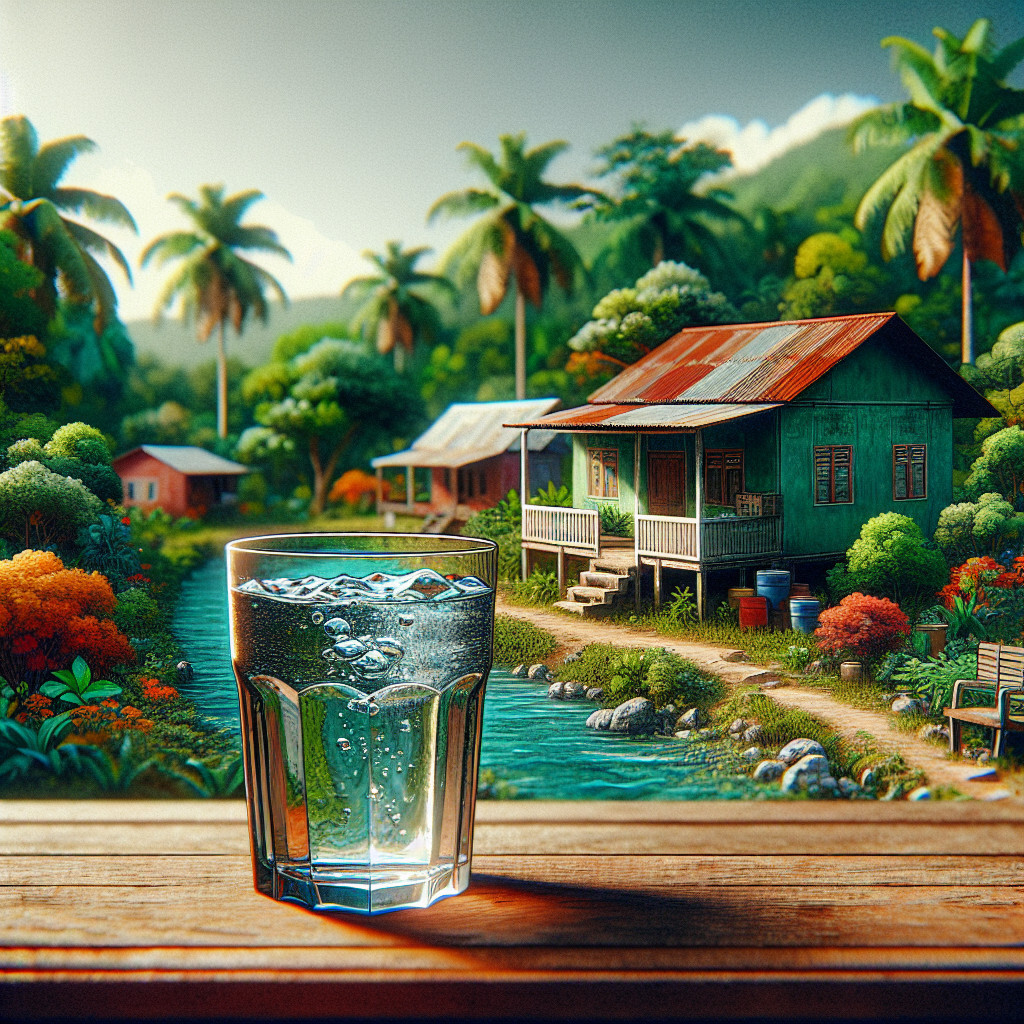-
Table of Contents
“Saint Kitts and Nevis: Where the Tap Water is Pure, Clean, and Safe to Drink!”
Introduction

Saint Kitts and Nevis, a small island nation in the Caribbean, has a public water supply that is generally considered safe to drink. The water is sourced from natural springs and wells, and undergoes treatment processes to ensure its safety. However, due to occasional issues with the island’s infrastructure, there may be instances of water supply interruptions or changes in water quality. Therefore, some residents and visitors opt for bottled water or use water purification methods as a precaution.
Understanding the Quality of Tap Water in Saint Kitts and Nevis
Saint Kitts and Nevis, a dual-island nation situated in the Caribbean Sea, is renowned for its picturesque landscapes, vibrant culture, and warm hospitality. However, one aspect that often goes unnoticed by many is the quality of tap water in this tropical paradise. This article aims to shed light on the quality of tap water in Saint Kitts and Nevis, providing a comprehensive understanding of its safety, taste, and overall suitability for consumption.
The primary source of tap water in Saint Kitts and Nevis is surface water, which is collected from rivers and streams, and then treated and distributed to households and businesses. The government, through the Water Services Department, is responsible for ensuring the quality and safety of the tap water. They adhere to strict guidelines and standards set by the World Health Organization (WHO) to ensure that the water is safe for consumption.
In terms of safety, the tap water in Saint Kitts and Nevis is generally considered safe to drink. Regular testing is conducted to monitor the presence of harmful substances such as bacteria, viruses, and chemical contaminants. The results of these tests are usually within the acceptable limits set by the WHO. However, it’s important to note that water quality can vary depending on the location and time of year. For instance, during the rainy season, there may be a higher risk of water contamination due to runoff from agricultural areas.
As for the taste, many locals and tourists alike have reported that the tap water in Saint Kitts and Nevis is relatively fresh and clean-tasting. This is likely due to the natural filtration process that occurs as the water travels through the island’s volcanic soil. However, some people may notice a slight chlorine taste. This is because chlorine is commonly used in the water treatment process to kill bacteria and other microorganisms.
Despite the general safety of the tap water, it’s recommended that visitors, particularly those with sensitive stomachs, stick to bottled water during their stay. This is because the local tap water may contain minerals and microorganisms that foreign visitors are not accustomed to, which could potentially cause minor digestive issues.
Moreover, it’s also advisable to use bottled water for brushing teeth and making ice cubes, especially in remote areas where the water supply may not be as well-regulated. It’s also worth noting that boiling tap water can be an effective way to kill any potential pathogens, making it safer to drink.
In conclusion, the tap water in Saint Kitts and Nevis is generally safe to drink, thanks to the rigorous testing and treatment processes in place. However, visitors are advised to err on the side of caution and opt for bottled water, particularly in remote areas or during the rainy season. By doing so, they can ensure their health and safety while enjoying the breathtaking beauty and rich culture that Saint Kitts and Nevis have to offer.
The Impact of Infrastructure on Saint Kitts and Nevis’ Tap Water
Saint Kitts and Nevis, a dual-island nation situated in the Caribbean Sea, is renowned for its picturesque landscapes, vibrant culture, and warm hospitality. However, one aspect that often goes unnoticed is the quality of its tap water. The infrastructure of Saint Kitts and Nevis plays a significant role in determining the quality of the tap water, which is a crucial factor for both residents and tourists.
The water infrastructure in Saint Kitts and Nevis is primarily managed by the Water Services Department, which is responsible for the provision of potable water to the population. The department ensures that the water supplied is safe for consumption and meets the standards set by the World Health Organization. The water supply in Saint Kitts and Nevis is sourced from a combination of surface water and groundwater, which is treated and tested regularly to ensure its safety.
However, the infrastructure of Saint Kitts and Nevis has faced several challenges over the years, which have had an impact on the quality of the tap water. One of the main issues is the aging water infrastructure. Many of the pipes and treatment facilities are old and in need of repair or replacement. This can lead to leaks and contamination, which can affect the quality of the water.
Furthermore, the islands are vulnerable to natural disasters such as hurricanes and droughts, which can damage the water infrastructure and disrupt the supply of water. For instance, Hurricane Luis in 1995 caused significant damage to the water infrastructure, leading to a temporary decline in the quality of the tap water.
Despite these challenges, significant efforts have been made to improve the water infrastructure in Saint Kitts and Nevis. The government has invested in upgrading the water infrastructure, including the replacement of old pipes and the construction of new treatment facilities. These efforts have resulted in a noticeable improvement in the quality of the tap water.
In addition to the government’s efforts, international organizations have also contributed to improving the water infrastructure in Saint Kitts and Nevis. For example, the Caribbean Development Bank has provided funding for several water infrastructure projects on the islands. These projects have not only improved the quality of the tap water but have also increased the reliability of the water supply.
The quality of the tap water in Saint Kitts and Nevis is generally considered to be good, especially in comparison to many other Caribbean nations. However, it is always advisable for tourists to use bottled water, especially if they have a sensitive stomach. This is because the tap water may contain minerals and microorganisms that are not harmful to the local population but may cause discomfort to visitors who are not used to them.
In conclusion, the infrastructure of Saint Kitts and Nevis plays a crucial role in determining the quality of the tap water. While there have been challenges, significant efforts have been made to improve the water infrastructure, leading to an improvement in the quality of the tap water. However, it is always advisable for visitors to use bottled water to avoid any potential discomfort.
Health Implications of Drinking Tap Water in Saint Kitts and Nevis
Saint Kitts and Nevis, a dual-island nation situated in the Caribbean Sea, is renowned for its picturesque landscapes, vibrant culture, and warm hospitality. However, one aspect that often raises questions among tourists and locals alike is the quality of tap water in the country. This article aims to shed light on the health implications of drinking tap water in Saint Kitts and Nevis.
The quality of tap water can significantly impact the health of individuals. It is, therefore, crucial to understand the source and treatment process of the water supply. In Saint Kitts and Nevis, the primary source of tap water is surface water, including rivers and streams, supplemented by groundwater from wells. The water undergoes treatment processes, including filtration and chlorination, to eliminate harmful bacteria and other contaminants.
However, despite these treatment processes, the tap water in Saint Kitts and Nevis may still pose certain health risks. One of the primary concerns is the presence of bacteria and parasites. Although chlorination is effective in killing most bacteria, some parasites like Giardia and Cryptosporidium can survive this treatment. These parasites can cause gastrointestinal illnesses, characterized by symptoms such as diarrhea, stomach cramps, and nausea.
Moreover, the tap water in Saint Kitts and Nevis has been reported to contain high levels of minerals, including calcium and magnesium. While these minerals are essential for human health, excessive consumption can lead to health issues. For instance, high calcium levels can contribute to kidney stones, while excessive magnesium can cause digestive problems.
Another concern is the potential presence of heavy metals in the tap water. These can originate from natural sources, such as the soil and rocks, or from human activities, such as mining and agriculture. Heavy metals like lead and mercury are toxic and can cause a range of health problems, from kidney damage to neurological disorders.
In light of these potential health risks, it is advisable for both residents and visitors to take precautions when consuming tap water in Saint Kitts and Nevis. Boiling water before consumption is a simple and effective way to kill bacteria and parasites. Alternatively, bottled water is widely available and is a safer choice, especially for those with weakened immune systems or chronic illnesses.
Furthermore, the government and relevant authorities in Saint Kitts and Nevis are taking steps to improve the quality of tap water. These include upgrading water treatment facilities, implementing stricter water quality standards, and conducting regular water quality tests. These efforts aim to ensure that the tap water is safe for consumption and meets international standards.
In conclusion, while the tap water in Saint Kitts and Nevis undergoes treatment processes to ensure its safety, it may still pose certain health risks due to the potential presence of bacteria, parasites, high mineral levels, and heavy metals. Therefore, it is advisable to take precautions when consuming tap water in the country. At the same time, the ongoing efforts by the government and relevant authorities to improve water quality are a positive step towards ensuring the health and well-being of both residents and visitors.
Comparative Analysis: Tap Water in Saint Kitts and Nevis vs. Bottled Water
Saint Kitts and Nevis, a dual-island nation situated in the Caribbean Sea, is renowned for its picturesque landscapes, vibrant culture, and warm hospitality. However, one aspect that often goes unnoticed is the quality of its tap water. This article aims to provide a comparative analysis of the tap water in Saint Kitts and Nevis versus bottled water, shedding light on the quality, safety, and sustainability of both.
The tap water in Saint Kitts and Nevis is generally safe to drink. The government ensures that the water supply is treated and purified to meet international standards. The water undergoes rigorous testing and treatment processes, including filtration, disinfection, and pH adjustment, to eliminate potential contaminants and ensure its safety. The Water Services Department, the primary water utility in the country, is responsible for maintaining the quality of the tap water and regularly monitors the water supply for any signs of contamination.
However, despite these measures, the taste and odor of the tap water can vary depending on the location and the source of the water. In some areas, the tap water may have a slightly chlorinated taste due to the disinfection process. This is not an indication of poor quality, but rather a necessary step to ensure the water is free from harmful bacteria and viruses.
On the other hand, bottled water is a popular choice among tourists and locals alike in Saint Kitts and Nevis. The bottled water industry in the country is regulated by the Bureau of Standards, which sets stringent quality standards for bottled water producers. These standards cover various aspects, including source water quality, bottling processes, and labeling requirements.
Bottled water is often perceived as safer and better tasting than tap water. However, it’s important to note that bottled water is not necessarily superior to tap water in terms of quality and safety. In fact, some bottled water brands simply use treated tap water. Moreover, the environmental impact of bottled water is significantly higher than that of tap water, due to the energy used in bottling processes and the waste generated by plastic bottles.
In terms of cost, tap water is considerably cheaper than bottled water. While the price of bottled water can vary depending on the brand and location, it is generally more expensive than tap water, which is virtually free. This makes tap water a more economical choice, especially for residents.
In conclusion, both tap water and bottled water in Saint Kitts and Nevis are safe to drink and meet international quality standards. The choice between the two often comes down to personal preference, cost, and environmental considerations. While bottled water may be more convenient and have a more consistent taste, tap water is a more sustainable and economical option. Regardless of the choice, it’s reassuring to know that whether you’re a resident or a visitor in Saint Kitts and Nevis, you have access to safe and clean drinking water.
Q&A
1. Question: Is the tap water in Saint Kitts and Nevis safe to drink?
Answer: Yes, the tap water in Saint Kitts and Nevis is generally considered safe to drink.
2. Question: What is the quality of the tap water in Saint Kitts and Nevis?
Answer: The quality of tap water in Saint Kitts and Nevis is generally good as it is treated and purified before distribution.
3. Question: Are there any common issues with the tap water in Saint Kitts and Nevis?
Answer: There are no common issues reported with the tap water in Saint Kitts and Nevis, but like any location, the quality can vary depending on the specific area and source of the water.
4. Question: Do I need to use a water filter for the tap water in Saint Kitts and Nevis?
Answer: While the tap water is generally safe to drink, using a water filter can further ensure the removal of any potential impurities.
Conclusion
The tap water in Saint Kitts and Nevis is generally safe to drink as it meets World Health Organization standards. However, it may taste different due to different treatment processes, and some travelers may prefer to drink bottled water to avoid potential stomach upset.






